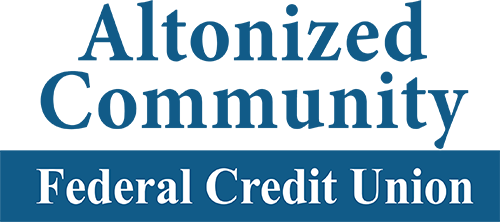Fraud Protection Center
The following information is designed to safeguard your financial information as well as provides tips for protecting yourself. If you were to become a victim of identity theft, information is provided here for what you would need to do next.
Plastic Card Fraud Protection
Debit card fraud has become more prevalent in the world today especially with all the merchant data breaches. In light of all these events, Altonized has tightened the security measures on our Debit Card Program to not only protect the members but also the credit union. Currently, all debit cards carry the restriction that any use outside of Illinois or Missouri requires a PIN number. If you are going to be traveling outside of the Bi-State area, please contact the credit union so that your card may be unrestricted for your travel period.
Credit and debit card fraud generally occurs when cards or card numbers are compromised through a merchant breach. By following these simple guidelines you can help protect yourself:
Keep a list of all your cards including the account number and phone number to the issuing company (keep this in a secure place).
Review your statements once you receive them. Make sure all charges are correct
Always sign a new card immediately
When making a purchase, make sure you receive the card and receipt and check for accuracy
Fill in all lines on the receipts at restaurants. Never leave blank lines
Never sign a blank card receipt
Travel only with the cards you will be using
Never give your account number over the phone unless you initiate the call
Do not write the PIN for the account on the card
To help keep cards safe, the credit union will periodically close and purge inactive debit or credit cards on our system. If there has been no activity for a period of time, the card will be closed out for security purposes.
Identity Theft Protection
Identity theft can occur when an individual obtains personal information such as your social security number, date of birth, address and financial account numbers. Once this information has been taken, the thief will assume your identity allowing them to illegally purchase items, open accounts or even apply for loans. Please use the following tips to help protect yourself:
Check your credit report on an annual basis to ensure all information is correct. Go to annualcreditreport.com for your free copy
Shred unwanted credit card offers
Never give your personal information or card numbers over the phone unless you initiated the call
Always verify your account statements for accuracy
Always safeguard your checks. Do not leave them in a place where others have access to them
Do not leave blank or cancelled checks in a unsecure location and most definitely do not sign blank checks in your checkbook
ATM Card Fraud
This fraud type can happen when you lose your card or lend it to someone else to use. The following tips will help protect you from this fraud:
Never write your PIN number on the ATM Card or in your wallet. Memorize the number or select one that you will be able to remember
Never use simple information such as date of birth or house number for the PIN
Always be aware of your surroundings when using the ATM. Avoid dark, secluded locations at night and make sure no one is close by when doing your transactions
Review statements for accuracy
Destroy old ATM cards after receiving a replacement
Phishing and Vishing Scams
Phishing is an internet scam where pop-up messages are used to deceive you into divulging personal or financial information over the internet. The message may appear to be from a company you deal with and will request an update on account information or sell you a special offer. However, once your personal information is entered the scammer will generally use it to steal your identity.
Vishing is similar but will be a message or text stating your account is locked or has been compromised and will instruct you to call a certain phone number to verify your account information. The credit union will never call you and ask for your account number or other personal information that we already have on hand.
Tips for protecting yourself:
If you receive an email or pop-up message asking for personal information, do not reply. Also, do not click on any link in the message
Never give any personal information via email or phone
If you need to update your account, either contact the office directly or log into your online account to make the changes
Use anti-virus and anti-spyware software as well as a firewall. Make sure these are update on a regular basis
If you receive any kind of message regarding your account that you are unsure of, please do not give out any information and contact the credit union immediately
If your information has been stolen, you will need to do the following:
Contact Altonized Community Federal Credit Union immediately
Contact the fraud departments of any one of the Credit Bureau agencies to have a fraud alert placed on your credit file. Experian 888-397-3742, Trans Union 877-322-8228, Equifax 888-202-4025
Close any accounts that you know have been tampered with or affected by fraud
File a police report. Get a copy of the report to submit to your creditors
File a compliant with the FTC. They maintain a database of identity theft cases used by law enforcement agencies for investigations


